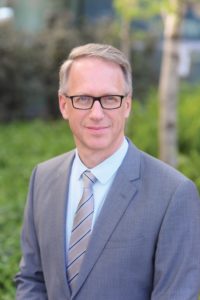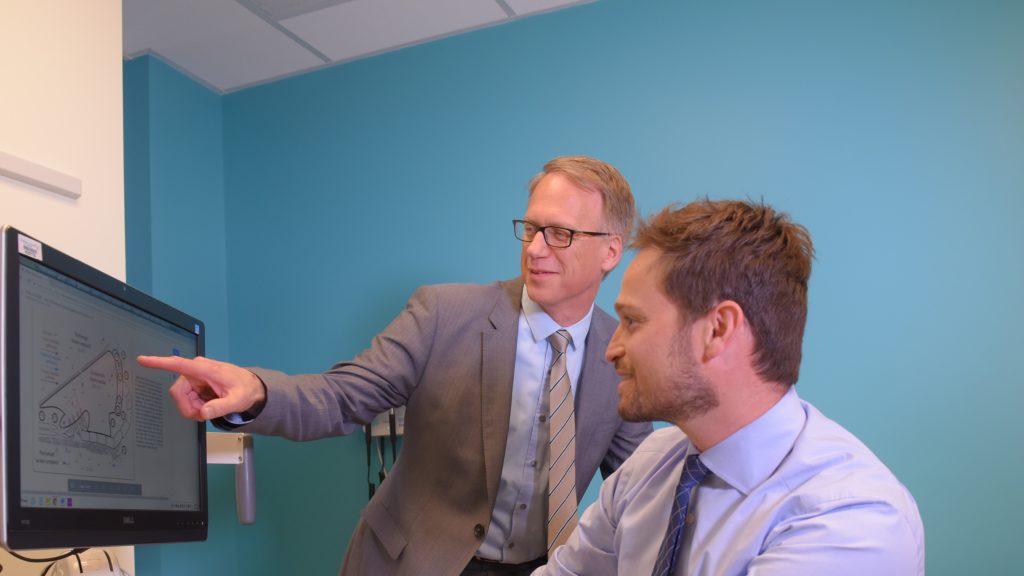Dr. David Freyer has already found tremendous fulfillment since joining Children’s Hospital Los Angeles in 2008 as a pediatric oncologist, serving as the director of its Survivorship and Supportive Care Program, as well as working with patients at the USC Norris Comprehensive Cancer Center.
But his on-call status is about to widen.
Freyer is one of 18 candidates who have completed formation and will be ordained permanent deacons for the Archdiocese of Los Angeles on Saturday June 7.
Freyer is also the only single male of this group to be ordained. Among those in the permanent deacon formation program currently, there are only four single men are among the 80 candidates. In recent years, single men such as Kevin McCardle (2022) and Douglas Zuniga (2023) have been ordained.
As a deacon, Freyer will serve at St. Philip the Apostle Church in Pasadena. In an interview with Angelus, he recounted his journey to ordination, which included an interruption in his formation brought on by the hospital staffing crisis during COVID-19.
You aren’t a native of Southern California, or a cradle Catholic. So how did you get to this place in time?
I grew up in the Chicago area and was raised Methodist in a home with a strong sense of social justice and an expectation to raise questions and think critically for ourselves. In college at DePauw University, I was exposed to the Catholic Church through the Charismatic Renewal and ultimately converted during medical school.
I originally was thinking about becoming a primary care physician to work with indigent patients, perhaps internationally, but through a series of experiences and decisions I became a pediatric oncologist instead. I feel very fortunate to have realized over the years that in this career, I’ve found I am exactly where God called me to be.
I lived with a Franciscan community in Chicago during my pediatric residency training, another spiritual tradition that has deeply influenced me.
I moved to Southern California from Michigan in December of 2007 when I was recruited to Children’s Hospital Los Angeles and the University of Southern California. It was a wonderful professional opportunity that has exceeded all I hoped for. My work here is a combination of patient care, research, teaching, and program leadership. I treat children, teens and young adults for leukemia and lymphoma, and I provide care for adult cancer survivors who were previously treated for cancer. My areas of clinical care and research focus are cancer survivorship, supportive care, and adolescent and young adult oncology.
What started you on this path of becoming a deacon?
Although I did not realize it, the seed was planted about the same time I entered the Church when I was 22 years old. At first, I wondered if I was being called to become a Franciscan priest. But after a great deal of discernment, I decided to continue my medical training and became a physician — something that had been a childhood dream and has proved to be a true vocation, too.
Yet the draw toward a religious vocation never left me. In 2017, I began attending St. Philip and, one Sunday, there was the reading about deacons from 1 Timothy that spoke to me. It was then that the seed that was planted long ago began to germinate.
During my career as a physician, I gradually understood how that career, for me, was God’s calling and a true vocation, as well. Now, I began to see the possibility and the beauty of being a deacon because one’s work in the world is a vital part of diaconal ministry. Becoming a deacon would not require me to leave my career as a physician, which wouldn’t have felt right, but to engage it more deeply.
What did you discover about yourself and your spiritual soul-searching during formation? Can you equate it all to attending medical school?
Chiefly through the prayer life that is cultivated in formation, my relationship with God deepened dramatically and became more honest and authentic. There is such wisdom in the Church’s use of the term “formation” for becoming a deacon because it incorporates, but goes far beyond, “education” and “training. A person is truly “formed” as a human being and disciple through this process. It’s challenging, frankly difficult at times, yet such a gift. Because of this, I have always felt that even at the end of it all, if I or our diaconate formation staff ultimately determined that ordination was not right for me, there is nothing about any of it I would have regretted. Whether or not I became ordained, Christ transformed me through the formation process.
As far as similarities to medical school, there is more that a person needs to learn than there is time to teach it all. When I was graduating from medical school, a friend and I used to chuckle that now we probably knew “just enough to be dangerous.” That’s not true in exactly the same way in being ordained a deacon — though there is some relevance — but the point is that in both callings we continue to learn, grow, and improve through our experiences, including what we are taught by those we try to serve.

How do you think being a deacon will influence the way you approach your career in medicine, and vice versa?
From the very beginning I have tended to articulate my vision of diaconal ministry in terms of combining the roles of physician and ordained minister of the Church. For me, one of the most beautiful aspects of serving as a deacon is how these two roles, while distinct, are not separate but are one. They inform each other.
What I see myself bringing into my role as a physician is a heightened understanding of the Incarnation, that is, how Jesus accompanies my patients, their parents and families, and caring professionals in the journey of serious illness. Along with that understanding is effective language to express it so that it strengthens others.
What I see bringing from the field back to the Church from my experience in the hospital is the witness of God’s people, including not only their suffering but also their heroism and faithfulness.
As an ordained minister in those situations, I am the eyes, ears, and hands of the Church witnessing the real experiences of God’s people, being present for sometimes uncomfortable and inconvenient realities the Church needs to witness and respond to. When serving at the altar assisting the priest, I see myself laying all of that onto the altar and giving it to Christ to transform in the Eucharist.
Another ongoing spiritual influence for me is being an oblate of St. Benedict, affiliated with the Saint Meinrad Archabbey, a Benedictine monastery and school of theology in southern Indiana. I became an oblate in 2018-2019, concurrent with entering diaconate formation. An oblate of St. Benedict seeks to express in ordinary life the wisdom of the Benedictine monastic way of life that is steeped in prayer and community. After becoming Catholic, becoming an oblate has been the next most foundational step in my faith journey and definitely complements, shapes, and supports my understanding of being a deacon.
What other real-life experiences do you bring as a deacon that can be useful for you?
I was married, divorced, and received a declaration of nullity. I have two adult daughters. Divorce is a painful life experience and healing afterward is a long-term commitment, but it does not necessarily “disqualify” someone from becoming a deacon. In fact, in a mysterious way, God uses our most trying experiences for higher purposes, sometimes because they humble us and what we learn through them may benefit others.
I am trying to approach ordination as more of a doorway than a destination. God will lead me to where God wants to use me in service. Given my personal path, ministering to divorced Catholics is something I would like to explore. As far as homilies go, giving them is a great privilege and responsibility. We have been trained well for this task but here there is no better way to learn than through actual experience. I look forward to becoming more proficient in using the tools and resources we have been given.
What would be your advice to anyone considering this ministry?
What I would recommend to anyone considering applying or entering formation is to be open to God changing you, calling you to a deeper relationship and growing in faith and trust. You won’t have to chase anything or try to make it happen yourself. Just engage in the process in good faith, do your part, and, through the formation staff and process, God will take care of the rest.

